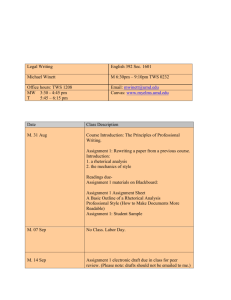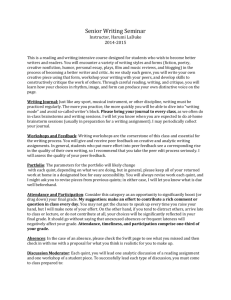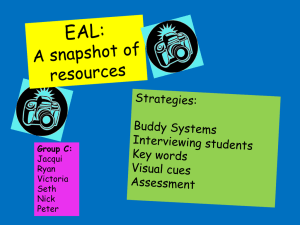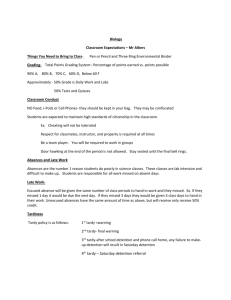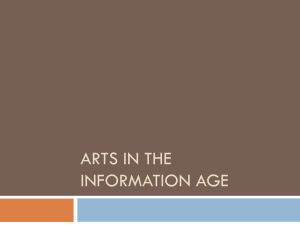English 101: Academic Writing
advertisement
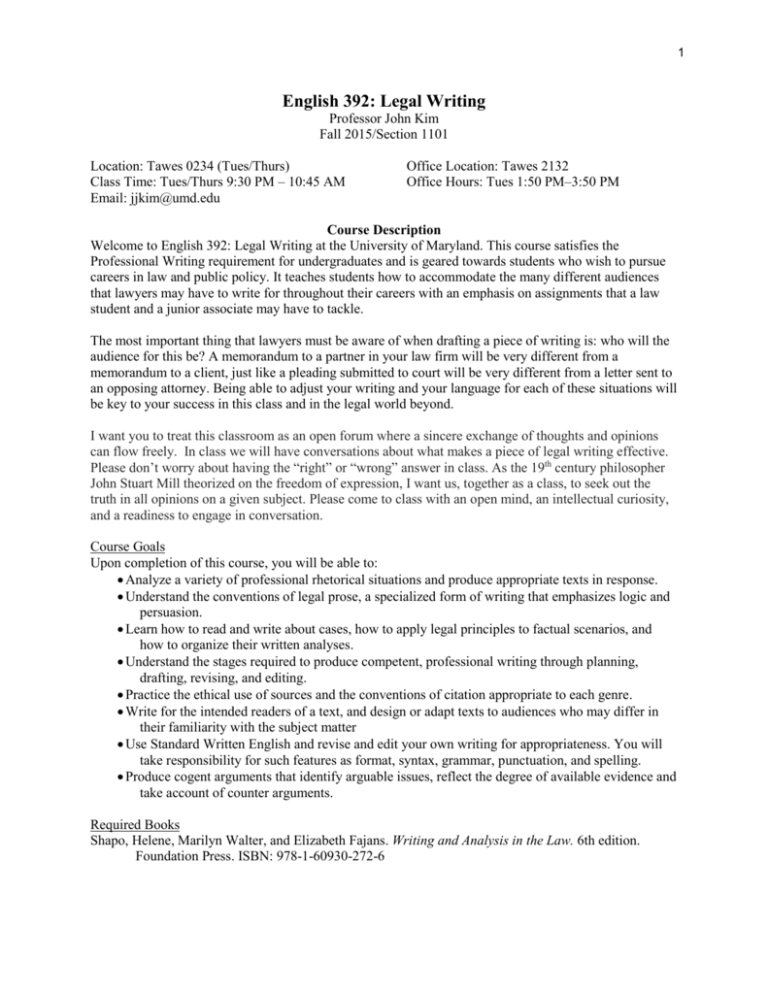
1 English 392: Legal Writing Professor John Kim Fall 2015/Section 1101 Location: Tawes 0234 (Tues/Thurs) Class Time: Tues/Thurs 9:30 PM – 10:45 AM Email: jjkim@umd.edu Office Location: Tawes 2132 Office Hours: Tues 1:50 PM–3:50 PM Course Description Welcome to English 392: Legal Writing at the University of Maryland. This course satisfies the Professional Writing requirement for undergraduates and is geared towards students who wish to pursue careers in law and public policy. It teaches students how to accommodate the many different audiences that lawyers may have to write for throughout their careers with an emphasis on assignments that a law student and a junior associate may have to tackle. The most important thing that lawyers must be aware of when drafting a piece of writing is: who will the audience for this be? A memorandum to a partner in your law firm will be very different from a memorandum to a client, just like a pleading submitted to court will be very different from a letter sent to an opposing attorney. Being able to adjust your writing and your language for each of these situations will be key to your success in this class and in the legal world beyond. I want you to treat this classroom as an open forum where a sincere exchange of thoughts and opinions can flow freely. In class we will have conversations about what makes a piece of legal writing effective. Please don’t worry about having the “right” or “wrong” answer in class. As the 19th century philosopher John Stuart Mill theorized on the freedom of expression, I want us, together as a class, to seek out the truth in all opinions on a given subject. Please come to class with an open mind, an intellectual curiosity, and a readiness to engage in conversation. Course Goals Upon completion of this course, you will be able to: Analyze a variety of professional rhetorical situations and produce appropriate texts in response. Understand the conventions of legal prose, a specialized form of writing that emphasizes logic and persuasion. Learn how to read and write about cases, how to apply legal principles to factual scenarios, and how to organize their written analyses. Understand the stages required to produce competent, professional writing through planning, drafting, revising, and editing. Practice the ethical use of sources and the conventions of citation appropriate to each genre. Write for the intended readers of a text, and design or adapt texts to audiences who may differ in their familiarity with the subject matter Use Standard Written English and revise and edit your own writing for appropriateness. You will take responsibility for such features as format, syntax, grammar, punctuation, and spelling. Produce cogent arguments that identify arguable issues, reflect the degree of available evidence and take account of counter arguments. Required Books Shapo, Helene, Marilyn Walter, and Elizabeth Fajans. Writing and Analysis in the Law. 6th edition. Foundation Press. ISBN: 978-1-60930-272-6 2 Course Policies and Procedures 1. Attendance Regular and punctual attendance. The writing you do in English 392 will be based on skills you will develop and hone in class. If you miss class for any reason, it will be your responsibility to find out what you missed and how you can make up the work. Unexcused absence and tardiness will be counted against your Participation grade. Unexcused or “discretionary” absences. Discretionary absences should be viewed not as “free days” but as days you may need to deal with emergencies. You may miss two full weeks of class without substantial penalty—you will, however, lose participation and attendance points for those missed classes. For each unexcused absence after two weeks, your final grade will be lowered by one full letter grade. This means that if you have an A average but have five unexcused absences (the equivalent of two weeks plus one class), you will earn a B in the course. Excused absences. The University excuses absences for certain reasons (illness, representing the UMD at certain events, religious observance, and the death of an immediate family member), provided the cause of absence is appropriately documented (see below). Religious observances. The University's policy "Assignments and Attendance on Dates of Religious Observance" provides that students should not be penalized because of observances of their religious beliefs; students shall be given an opportunity, whenever feasible, to make up within a reasonable time any academic assignment that is missed because of individual participation in religious observances. Students are responsible for obtaining material missed during their absences. Furthermore, students have the responsibility to inform the instructor of any intended absences for religious observances in advance. The student should provide written notification to the professor within the first two weeks of the semester. The notification must identify the religious holiday(s) and the date(s). Documentation Requirements to Justify an Excused Absence for Illness. The University’s policy is to excuse class absences that result from a student’s own illness. The procedure and documentation required for an illness to be an excused absence differs depending on the frequency of the absence. For a single class meeting missed: If you miss only one class meeting for illness, you may submit a selfsigned note to the instructor (that is, a note from a health care provider is not required for a single class missed, and the Health Center will not provide written excuses for a single absence). Each note must also contain an acknowledgment by the student that the information provided is true and correct; in this way, it must follow the Code of Student Conduct or may result in disciplinary action. Such documentation will NOT be honored as an excused absence if the absence coincides with a Major Scheduled Grading Event, like a paper due date. If you know you will miss class, make an effort to alert your instructor and make arrangements in advance. Also, your documentation must be presented to the instructor upon returning to class. For Multiple but Non-Consecutive Meetings Missed: If you will miss more than one class meeting for a medical concern, but these will not be consecutive, you should provide documentation from a health care provider upon returning to class after the first of these absences that details future dates to be missed OR provide a note from a doctor that states specific dates missed (the note must state specific dates, rather than broadly name a time frame; that is, for example, documentation must say the student missed class on 9/12, 9/16 and 9/20 for a medical concern, rather than saying the student may have missed class repeatedly between 9/11-9/21). 3 For Multiple Consecutive (more than one in a row) Meetings Missed OR an Absence Involving a Major Grading Event: If you will have a prolonged absence (meaning more than one absence for the same illness), you are required to provide written documentation of the illness from the Health Center or from an outside health care provider upon returning to class. In cases where written verification is provided, the Health Center or outside health care provider shall verify dates of treatment and indicate the time frame that the student was unable to meet academic responsibilities. No diagnostic information need be provided on this note. Absence due to participation in a University Event: If your absence is not due to an illness but is, rather, due to your participation in an official University event, you must provide documentation for this absence prior to the absence; the documentation should be an official form from the University. 2. Participation You are expected to be prepared for class and to participate in class discussions, to be able to respond to questions posed to you, to have drafts when they are due, and to complete in-class writing activities. Your active participation will contribute to your final grade. While I rely on students to raise their hands in class, I will also cold call students in order to get a conversation started. 3. Late Papers Papers are due on the date designated on the course syllabus. Assignments that are due on a day when we meet for class should be completed by or before the beginning of class. Assignments that are due on a day when we do not meet for class should be completed and uploaded to ELMS/Canvas by or before 11:59 p.m. on the due date. Late papers will be marked down one letter grade per day late, including weekends. 4. Draft Workshops Draft workshops enable you to develop two major writing skills that are integral to this course: (1) learning to be a critic of your own writing and the writing of others, and (2) learning how to revise your work given comments and questions from your peers. Your writing will improve by having others read and respond to it. We will have a draft workshop before each assignment is due. During these sessions, you will exchange your paper with a peer (or peers) in the course and offer revision suggestions. 5. Paper Format Paper formats will change for every assignment per the audience of the writing. In general though, you should use Times New Roman 12 point font for all assignments. 6. Office Hours Think of my office as an extension of the classroom and use my office hours to discuss any aspect of your writing or reading, as well as any questions you may have about class procedures or requirements. Come to office hours with questions about class discussions, writing techniques or strategies, and so on. During my open office hours, you may stop in my office whenever you like. I am also happy to schedule another time to meet if my office hours conflict with your schedule. We will have scheduled one-on-one conferences in my office or a designated conference room. These meetings are mandatory. If you cannot attend our scheduled conference, please email me at least 2 hours before our planned time. If you miss our conference without emailing, I will count it as a class absence. 4 7. Email I’m always happy to answer questions via email. Before you email me with a question, first check class handouts and the available files on the Canvas/ELMS site to see if your question can be answered there. When emailing, include a subject header, “Re: Engl 392-[insert appropriate issue]”. Always sign your emails with your name. Please do not use emoticons. 8. Extra Credit There is no extra credit offered in this course. 9. Writing Center All students should consider visiting the tutors at UMD’s Writing Center as a way to improve the overall quality of their writing. The writing center is for all student writers—including those who see themselves as strong writers. It is an excellent resource for you; please take advantage of it. The Writing Center offers both daytime and evening hours. Online tutoring is also available. You can make an appointment through the website below. Website: <http://english.umd.edu/academics/writingcenter> Address: 1205 Tawes Hall (301) 405-3785 writadmin@umd.edu 10. Food There is no loud or smelly food allowed in class. If you have food in class try to be mindful and respectful of your classmates. 11. Cell Phone and Laptop Policy Use of phones in class is strictly prohibited. Laptops and tablets are allowed only for reviewing drafts of papers. Be prepared to take notes and perform in-class writing with a pen and paper. It is possible to attend every class and still receive a failing Participation grade based on your cell phone use. Grading and Revision Grades The percentages of contribution to your final grade are as follows: Discussion board posts, blog posts, draft workshops, reading quizzes, Reflective Writing Assignments Participation Personal Statement Case Briefing Legal Memorandum to Partner Legal Brief Letter to Client 10% 15%k 5% 15% 15% 20% 20% 15% 5 Academic Integrity Plagiarism, whether it is submitting someone else’s work as your own, submitting your own work completed for another class without my permission, or otherwise violating the University’s code of Academic Integrity, will not be tolerated. You are expected to understand the University’s policies regarding academic integrity. These policies can be found at the website of the Office of Student Conduct, www.shc.umd.edu. Please visit this website, click on the “students” link, and read the information carefully. Student Learning Your success in the class is important to me. If there are circumstances that may affect your performance in this class, please let me know as soon as possible so that we can work together to develop strategies for adapting assignments to meet both your needs and the requirements of the course. In order to receive official university accommodations, you will need to register and request accommodations through the Office of Disability Support Services. DSS provides services for students with physical and emotional disabilities and is located in 0106 Shoemaker on the University of Maryland campus. Information about Learning Assistance Service and/or Disability Support Service can be found www.counseling.umd.edu/LAS or www.counseling.umd.edu/DSS. You can also reach DSS by phone at 301-314-7682. Course Assignments Personal Statement: Your audience for this assignment is the admissions officer of the law school of your choice. Your transcript and resume speak for themselves. So what is it about you that will make them want to pick you out of thousands of applicants to fill one of a few hundred seats of the incoming class of law school students? Case Brief: For this assignment, you will breakdown and summarize a legal opinion into its component parts. Legal Memorandum: Your boss asks you to write her a memo about a legal issue that a client is having. It is your job to write a memo that gives an overview of the pertinent statutes and case law and analyze how your client’s issue might be argued. Legal Brief: Legal briefs are the documents that you submit to court on behalf of your client. Your audience here is the judge, but you must also keep in mind that the opposing side will be submitting a reply brief as well. You will need to support your side while also countering arguments from your opposition. Letter to a Client: Now that you’ve submitted your briefs for a case, you’ve got to break some news to your client. Your client doesn’t understand legalese. You still need to be able to find the language to explain complex legal issues to a layperson—and also tell your client the likelihood of your success. 6 English 392 - Course Schedule WAL – Writing and Analysis in the Law Day Week 1 Day 1: Sept. 1 Day 2: Sept. 3 Week 2 Day 3: Sept. 8 Session Objectives Introductions; Discuss Syllabus; Course Objectives Day 4: Sept. 10 Personal Statement Peer Review Week 3 Day 5: Sept. 15 Day 6: Sept. 17 Week 4 Day 7: Sept. 22 Day 8: Sept. 24 Week 5 Day 9: Sept. 29 Overview of Legal System and Case Law; IRAC WAL – 11-38 (Chapter 1) Intro to Case Brief assignment WAL – 39-63 (Chapter 2) Reading Judicial Decisions WAL – 63-86 (Chapter 2) Reading Statutes WAL – 87-111 (Chapter 3) Case Briefings Draft of Case Brief of at least 2 cases due -- upload to Canvas and bring to class for peer review Day 10: Oct. 1 Case Briefings Week 6 Day 11: Oct. 6 Day 12: Oct. 8 Week 7 Day 13: Oct. 13 Day 14: Oct. 15 Week 8 Day15: Oct. 20 Introduction of Legal Memorandum; Application of law and macro-organization Application of law and microorganization Writing the Legal Memorandum WAL – 111-134 (Chapter 4) Draft of Case Brief of 2 different cases -- upload to Canvas and bring to class for peer review Final Draft of Case Briefs Due More on the Legal Memorandum WAL – 189-202 (Chapter 8) WAL – 203-223 (Chapter 9) The Legal System; Personal Statements; Rhetorical Situation Personal Statement; Writing Sentences NO CLASS - CONFERENCES Reading Due Writing Due WAL – 1-11 (Chapter 1) Blog #1 (Introduction) WAL – 225-246 (Chapter 10) Blog #2 (Personal Statement Brainstorm) WAL – 135-153 (Chapter 5) WAL – 163-188 (Chapter 7) Draft of Personal Statement due -upload to Canvas and bring to class for peer review Bring a copy of your most up-to-date Resume to class (this will not be graded) Blog #3 (Personal Statement Process and Message) Final Draft of Personal Statement due – upload to Canvas Blog #4 (Reflection on Personal Statement) Blog #5 (Reflection on Case Brief Assignment) Draft of Legal Memorandum Statement of Facts and Question Presented - upload to Canvas and 7 online peer review Complete online peer review by 11:59 PM tonight Full draft of Legal Memorandum due -- upload to Canvas and bring to class for peer review Final draft of Legal Memorandum due Blog #6 (Reflection on Legal Memorandum) Day 16: Oct. 22 Week 9 Day 17: Oct. 27 Day 18: Oct 29 Week 10 Day 19: Nov. 3 Day 20: Nov. 5 Week 11 Day 21: Nov. 10 NO CLASS – CONFERENCES Preparation of Trial Brief; MicroStructure Preparation of Trial Brief Blog #7 (Outline with Headers) Day 22: Nov. 12 Preparation of Trial Brief Draft of Caption, Introduction, Statement of Facts, and Question Presented due -- upload to Canvas and bring to class for peer review Week 12 Day 23: Nov. 17 Day 24: Nov. 19 Week 13 Day 25: Nov. 24 Day 26: Nov. 26 Week 14 Day 27: Dec. 1 Day 27: Dec. 3 NO CLASS - CONFERENCES Week 15 Day 28: Dec. 8 Day 29: Dec. 10 Peer Review Letter to Client Peer Review of Legal Memorandum; Introduction to Legal Brief Components of a Trial Brief WAL – 349-360 (Chapter 15) WAL – 361-365, 370-396 (Chapter 15) Preparation of Trial Brief; MacroStructure Draft of Caption and Introduction due -- upload to Canvas and bring to class for peer review NO CLASS - CONFERENCES Peer Review of Legal Brief NO CLASS – THANKSGIVING BREAK Introduction to Letter to Client Letter to Client and others Open office hours in class with Professor Kim Full Draft of Legal Brief -- upload to Canvas and bring to class for peer review WAL 305-327 (Chapter 14) Final Draft of Legal Brief Due WAL – 328-348 (Chapter 14) Blog Post (Planning for Letter to Client) Full draft of Letter to Client Due – upload to Canvas and bring to class for peer review Final Draft of Letter to Client Due at 11:59 PM


